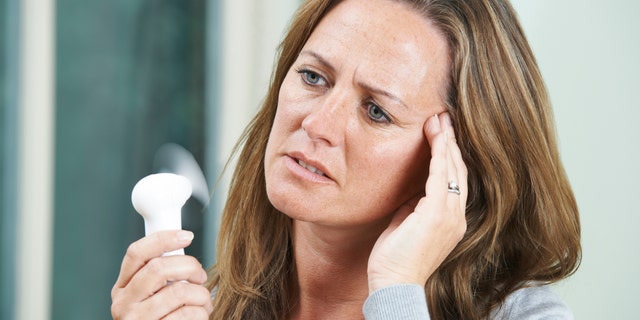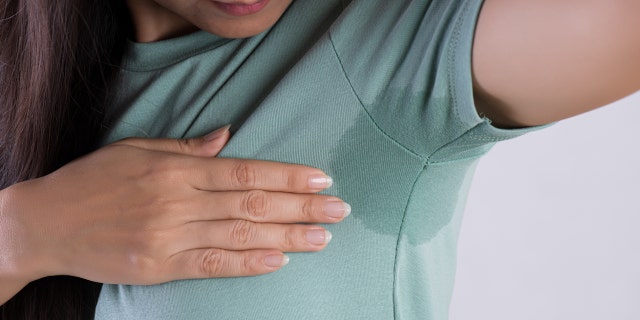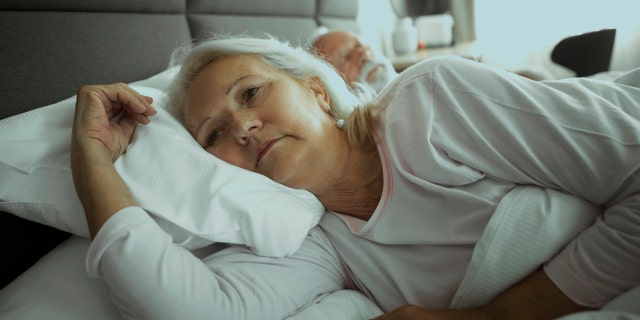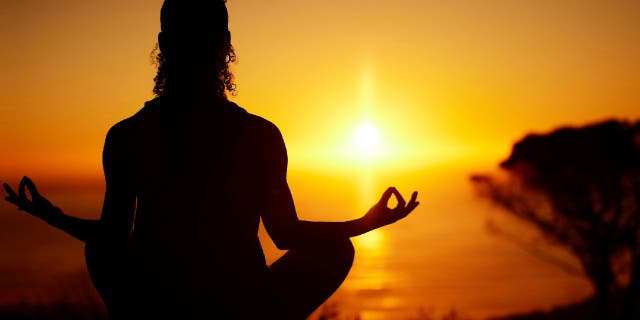
Between those dreaded hot flashes, night sweats, mood swings and hours spent tossing and turning at night, menopause can be downright miserable.
Hormone replacement therapy is one option, but if you’re concerned about the risks or want to try natural fixes first, the good news is that there are non-hormonal remedies that can help.
A woman officially enters menopause when 12 consecutive months have passed without a menstrual period.
Leading up to this time, periods can be irregular. This often happens between the ages of 45 and 55.
6 WAYS YOU’RE MAKING YOUR MENOPAUSE SYMPTOMS WORSE
There are lots of symptoms that come with menopause that can be frustrating and affect your day-to-day life.
Here are five of the most common symptoms of menopause and natural remedies to try to relieve each symptom.

Women go through menopause after they haven’t had a period for 12 months in a row. (Fabian Sommer/picture alliance via Getty Images)
- Hot flashes
- Night sweats
- Vaginal dryness
- Insomnia
- Irritability
- Bladder control
- Dry skin
1. Hot flashes
It’s unclear what causes hot flashes, but they might be linked to the adrenal glands. When estrogen falls during menopause, the adrenal glands can become deficient, which then causes a surge of cortisol to be released and, in turn, hot flashes, said Dr. Prudence Hall, founder of The Hall Center in Santa Monica, California.
Approximately 80% of women will experience hot flashes and about 10% will have significant hot flashes that last for over 10 years, said Dr. Mary Jane Minkin, a clinical professor of obstetrics, gynecology and reproductive sciences at Yale University School of Medicine in New Haven, Connecticut, and author of “A Woman’s Guide to Sexual Health.”
Herbs such as black cohosh, wild yam, Korean ginseng and red clover can help, but you should consult with a physician, naturopath or herbalist to make sure you choose a reputable brand.
Also, avoid triggers like wine and spicy foods; try adding soy foods to your diet and dress in layers.

Hot flashes are one of the most common systems of menopause. (iStock)
Although exercise will likely make your hot flashes worse while you’re doing it, it can help alleviate symptoms throughout the day.
NAOMI WATTS ADMITS SHE WAS ‘SPIRALING OUT OF CONTROL’ WHEN SHE WENT THROUGH MENOPAUSE AT 36 YEARS OLD
Women who reported less than three sessions a week of physical activity had more severe symptoms of menopause, including hot flashes, compared to women who were more active, a study in the journal Menopause found.
Losing weight can also help hot flashes, since women who are heavy have worse hot flashes than slimmer women, Minkin said.
2. Night sweats
Approximately 95% of women will also deal with night sweats, which is not only uncomfortable, but it makes getting a good night’s sleep nearly impossible.
To feel better, adjust the thermostat, try cooling sheets, pillows or blankets and wear moisture-wicking pajamas.
ACTRESS CHERYL HINES ON THE AWKWARDNESS OF MENOPAUSE
You can also open up your windows if it is not too hot or too cold — and put a fan close to your bedside.

Night sweats can be extremely uncomfortable, so making sure you have a cool environment is essential. (iStock)
3. Vaginal dryness
Unlike hot flashes that tend to get better with time, unfortunately vaginal dryness gets worse. The decrease in estrogen levels causes the vaginal tissues to become thin and dry, which leads to discomfort, itching, irritation and pain during sexual intimacy.
If it’s not treated, vaginal dryness can lead to atrophic vaginitis, a condition that causes the walls of the vagina to become inflamed.
Some things to try to include long-lasting over-the-counter moisturizers that can be used two to three times a week, or coconut oil and personal lubricants when you have sex.
4. Insomnia
Restlessness, waking up several times throughout the night, or trouble falling asleep are all common during menopause.
Questioning who you are or your life’s purpose, which is common during this stage of life, can cause anxiety and also make sleeping difficult, Hall said.

Menopause can cause individuals to have a hard time falling asleep and staying asleep at night. (iStock)
Make a point to exercise every day, which can help you sleep — but if you do it too close to bedtime, it might keep you up.
Avoid known triggers like alcohol and caffeine, and practice good sleep hygiene by keeping your bedroom cool and dark and powering down electronics one to two hours before you get into bed.
Acupuncture can help relieve sleep disturbances associated with menopause too, according to a systematic review and meta-analysis published in the journal Obstetrics & Gynecology.
You can also try calming practices like yoga and meditation before hitting the hay to keep yourself extra relaxed.
5. Irritability
During menopause, there are many factors at play that can cause you to feel on edge.

During menopause, continue to do the things that you love to do, keep yourself busy and practice calming techniques when necessary. (iStock)
For starters, when estrogen is low, it can affect the neurotransmitters in the brain and lead to irritability and mood swings. If your libido is low and your body isn’t releasing oxytocin, the “love hormone” during an orgasm, your mood can suffer. Not to mention that if you’re not sleeping, you’re bound to feel crabby.
To cope, find opportunities to de-stress and relax, whether it’s heading to the spa for a massage, meditating or meeting friends for dinner. If your poor mood persists, it’s important to see your doctor because thyroid levels can plummet during menopause, which might be the real reason you’re feeling low.
Remember to continue doing the things that bring you joy.
CLICK HERE TO SIGN UP FOR OUR LIFESTYLE NEWSLETTER
Although menopause is no walk in the park, it’s important to take time to take care of yourself.
“Even if we’ve given our care, our love and our attention to everyone else, now is the time for ourselves, so we stay full of light, love and life,” Hall said.
6. Bladder control
It is common to lose bladder control during menopause.
Some things you can do to help with bladder control during menopause is to lower your intake of beverages that contain caffeine, since this typically fills the bladder quickly.
You can also try a more scheduled approach to going to the bathroom. While this may take time to establish, try to retrain your body to go to the bathroom at certain times of the day, which over time can help the urge to use the bathroom at any point in the day go away.
Two times of the day to plan a trip to the bathroom are as soon as you wake up in the morning and before going to bed for the night. Also, try to not drink too much water right before you go to bed to avoid having to go during the night.
7. Dry skin
If you are noticing that your skin is extra dry, which commonly happens during menopause, make sure that you are moisturizing a little extra.
To keep your skin moisturized, drink plenty of water. Also, find a face moisturizer that works for you and your skin type.
CLICK HERE TO GET THE FOX NEWS APP
The most important time to moisturize is after washing your face, which is vital to keeping skin clean, but can also have a drying effect. To avoid skin dryness, make sure to moisturize multiple times a day.
Julie Relevant contributed reporting.

 Latest Breaking News Online News Portal
Latest Breaking News Online News Portal




